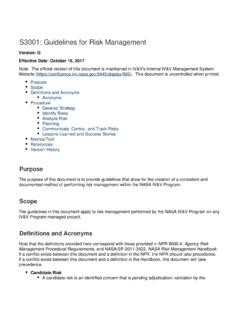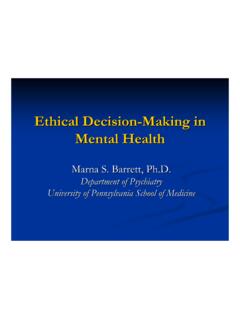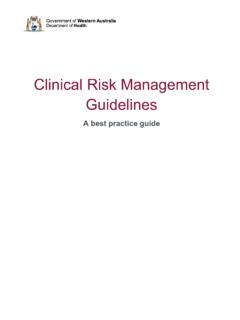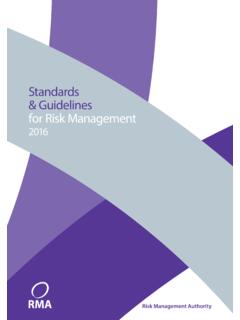Transcription of Using an Ethical Decision-Making Model to Address ... - ed
1 Using an Ethical Decision-Making Model to Address Ethical Dilemmas in School Counseling Timothy Brown, Stephen A. Armstrong, Samuel Bore, and Chris Simpson Texas A&M University-Commerce 2 Abstract School counselors frequently face Ethical dilemmas. These dilemmas often involve relationships with principals, parents, and other stakeholders. School counselors may confront complex Ethical issues involving confidentiality, student safety, parental rights, and social media. The American School Counselor Association recommends following an Ethical Decision-Making Model when dealing with complex Ethical issues. An explanatory case study is provided along with sample dilemmas to illustrate how an Ethical Decision-Making Model might be used within the school setting.
2 Keywords: school counseling, ethics, Ethical Decision-Making , Ethical dilemmas 3 Using an Ethical Decision-Making Model to Address Ethical Dilemmas in School Counseling Ethics refer to moral and value-based decision making . Professional ethics extend beyond personal values and include behaviors deemed as good by the profession. These values have been codified and accepted by the counseling profession. Ethical codes were developed out of a need for counselors to morally solve practical problems in a consistent manner (Freeman, Engels, & Altekruse, 2004). Professional counselors, including school counselors, are required to adhere to an Ethical code (American Counseling Association [ACA], 2014).
3 This article focuses on Ethical dilemmas that can arise for school counselors and approaches school counselors can take to solving these Ethical dilemmas. In general, most Ethical problems are not difficult for school counselors to resolve. However, complex Ethical dilemmas can occur when the solution appears ambiguous. When counselors cannot find a clear decision , they will often review an Ethical code (Freeman et al., 2004); however, knowing the Ethical codes differs greatly from applying the Ethical code (Lambie, Ieva, Mullen, & Hayes, 2011). At times Ethical principles can be at odds with each other. When this happens, a complex Ethical dilemma results (Freeman et al., 2004; Lazovsky, 2008).
4 When faced with a complex Ethical dilemma, school counselors may desire to use a simple solution (Foster & Black, 2007) such as only trusting their value judgment (Kitchener, 1984). They may also turn to the code of ethics for answers (Freeman et al., 2004). However, a more in-depth process is often needed. 4 The American Counseling Association published the most recent edition of its Code of Ethics in 2014. The American School Counselor Association (ASCA) also published its most recent edition of the Ethical Code for School Counselors, an Ethical code directly addressing many of the dilemmas unique to school counselors, in 2016. Both codes were designed to help counselors make decisions that will protect both the students they serve and the profession (Schmidt, 2008).
5 Ethical decisions can be difficult for school counselors because they are constantly seeking to minimize any harm while maximizing benefit to students (ACA, 2014; Lambie et al., 2011). School counselors often approach these Ethical decisions with a personal sense of morality and values. These personal values provide the basis for the frequent small Ethical decisions a school counselor must make (Levitt, Farry, & Mazzarella, 2015). The way school counselors make Ethical decisions may vary by their level of professional development (Foster & Black, 2007). As school counselors gain experience, they may rely more on intuition or instinct than on a more conscious process of Ethical decision making (Levitt et al.)
6 , 2015). At times school counselors may also consult a variety of sources such as colleagues, Ethical codes, and school district policy when making decisions (Lambie et al., 2011). Ethical Decision-Making Model When faced with an Ethical dilemma, school counselors may refer to Ethical codes for guidance (Bodenhorn, 2006; Freeman et al., 2004). Because school counselors regularly face Ethical dilemmas (Bodenhorn, 2006; Hicks et al., 2014; Moyer, Sullivan & Growcock, 2012), they need a methodology for confronting these dilemmas. 5 The Ethical Standards for School Counselors states a school counselor should use an Ethical Decision-Making Model when faced with an Ethical dilemma (ASCA, 2016).
7 School counselors should also document the steps of their Decision-Making (ASCA; Hicks et al., 2014). Over 30 Ethical Decision-Making models are available to school counselors (Cottone & Clause, 2000). These models differ in emphasis. Some focus on multicultural considerations or community while others focus on counselor education or school counseling (Levitt et al., 2015). While Ethical models are prevalent in the literature (Remley & Herlihy, 2016), there is no clear criteria for selecting one Model over another (Cottone & Claus, 2000). However, ASCA (2016) listed the Solutions to Ethical Problems in Schools (STEPS) as an example of a Model designed for school counselors in the Ethical Code for School Counselors.
8 This Model was created by Carolyn Stone (2013). The Model contains nine steps: 1. Define the problem emotionally and intellectually. 2. Apply the ASCA and ACA Ethical codes and the law. 3. Consider the students chronological and developmental levels. 4. Consider the setting, parental rights, and minors rights. 5. Apply the moral principles. 6. Determine your potential courses of action and their consequences. 7. Evaluate the selected action. 8. Consult. 9. Implement the course of action. This Model provides school counselors with a clear enumerated approach to Ethical Decision-Making . Using a concrete approach may provide comfort to some 6 counselors when faced with complex Ethical dilemmas.
9 This Model will be used to Address the explanatory case and Ethical dilemmas that school counselors might encounter. Case of Ms. Hannah Ms. Hannah is a first year school counselor at suburban elementary school in the southern United States. She holds a master s in school counseling and has completed a one year internship prior to accepting the position. During her master s degree, Ms. Hannah completed a course in counseling ethics. This course required Ms. Hannah to read both the ACA (2014) Code of Ethics and the ASCA (2016) Ethical Code for School Counselors. At the outset of her first year, Ms. Hannah felt confident she would be competent to practice ethically; however, Ms. Hannah encountered several Ethical dilemmas soon after beginning at her new school.
10 These Ethical dilemmas are listed at the end of each section to illustrate possible Ethical concerns. Following each dilemma an example of how to use the STEPS Ethical Decision-Making Model is provided. Ethical Dilemmas Related to Confidentiality The law does not specify the rights of minors in regards to confidentiality (Wehrman, Williams, Field, & Schroeder, 2010). This may be one of the reasons confidentiality is the most frequently considered Ethical dilemma (Bodenhorn, 2006). While the ACA (2014) Code of Ethics and ASCA (2016) Ethical Code for School Counselors offer specific guidelines on confidentiality, Ethical problems arise when school counselors are conflicted between maintaining confidentiality and helping the student in other ways.
















